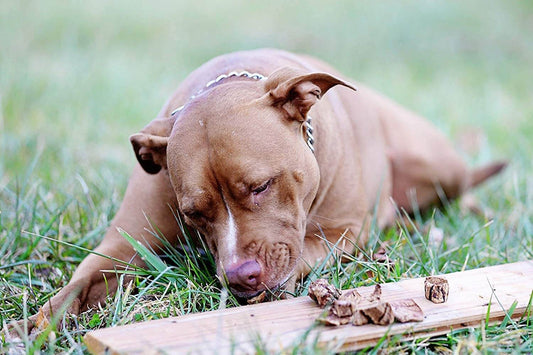
Dog Upset Stomach: Why Bruno's Grass Addiction Has to Stop
Dawn Miller Apr 16, 20254 Minute ReadEven if Bruno never says a word, sometimes a dog upset stomach is hard to miss.
Sunday morning, I woke up to the distinct sound of Bruno gulping down mouthfuls of grass in the backyard and gagging. Not fun to think about. But we've all been there.
Apparently, his brilliant solution to feeling a little queasy was to devour as much grass as possible before I could stop him. Pixie watched with a worried expression, before looking at me like she’d write a complaint letter to the manager (me) if she could.
Bruno’s upset stomachs are usually mild and quick to pass. But sometimes his temperamental tummy is a sign your dog needs extra attention.
Why Do Dogs Get Upset Stomachs?
I swear it's not my cooking.
Upset stomachs are pretty common. But figuring out what’s causing them can feel like detective work.
Some dogs get upset stomachs more quickly than others. They seem predisposed to tummy troubles based on genetics, their tendency to eat things they shouldn't, and even lack of sufficient collagen (the body's structural protein).
I noticed Bruno's dilemma early, within days of welcoming him into our home.
The truth is that many things can cause stomach upset in dogs:
- Dietary Oopsies. In the wild, dogs are scavengers who eat anything to survive. Resourceful...yes. But an unnecessary throwback to ancestral instincts when food is plentiful in our house.
- Food Allergies or Sensitivities. Dogs with food allergies often experience stomach issues, skin itching, and other unpleasant symptoms. Soy, wheat, and fish are 3 that many dogs struggle with.
- Lactose Intolerance. Like many people, dairy is a no-go. Dogs eating your toddler's ice cream for likes on Instagram—not cute. You'll both pay for that later.
- Rapid Diet Changes. Switching foods too quickly can upset their stomachs, even if it’s a better diet.
- Infections or Parasites. Bacterial infections, viruses, or even parasites can lead to vomiting, diarrhea, and general misery.
- Table Scraps. Dogs certainly can eat people's food. And it can be good for dog health. But be intentional. Dinner bones can splinter or lodge, causing damage to the digestive tract. Fried foods should definitely be off the menu. Fresh green beans, berries, pumpkin, and sweet potato are good sources of fiber and antioxidants. Plain yogurt and natural peanut butter—okay in moderation.
- Stress or Anxiety. Changes in routine, travel, or loud noises can affect digestion.
Having ruled out most allergies and parasites, we believe Bruno's tendency toward stomach upset is primarily caused by his nervous ways. Although the half-eaten burrito he scarfed down at the park before I could say "leave it" last week certainly didn't help.
Signs of an Upset Stomach
- Vomiting or dry heaving (Definitely a sign to pause breakfast plans)
- Diarrhea or constipation (The backyard evidence isn’t always subtle)
- Loss of appetite (Pixie refusing food? Now I’m panicking.)
- Lethargy (Less zoomies, more snoozing)
- Excessive drooling or lip licking (Trying to swallow something unpleasant, perhaps acid reflux)
- Abdominal pain or discomfort (They might arch their back or act restless)
- Eating grass (Nothing to worry about with the occasional nibble. But if they're downing it like a glass of wine on a girls' night out, then something's wrong.)
What to Do for a Dog Upset Stomach
Dog experts believe that dogs eat grass when they feel sick because the extra fiber may help them pass parasites out the other end. But this remedy doesn't work on other causes. Here are some things that do:
1. Try a Bland Diet for Dogs
Sometimes, the best approach is to give their digestive system a break by going back to basics.
So, what is a bland diet for dogs?
A bland diet for dogs can include easy foods like boiled chicken or turkey with plain rice or pumpkin. Simple, easy to digest, and soothing. Added nutrition to support digestive health.
Pumpkin is a great example. It's loaded with beta-carotene, vitamins A, C, and E, and selenium. These antioxidants can have a soothing, anti-inflammatory effect.
It can also mean sticking with their kibble and nothing else until the symptoms pass...or being very selective with their dog treats.
2. Stick with Single-Ingredient Dog Treats
This is part of the bland diet. You want nothing questionable. Artificial colors, flavors, preservatives, and added sugar don't belong in healthy dog snacks.
Time to go back to basics—natural. Feed a dog's instinct to chew.
Think K9 Connoisseur beef lung bites and grass-fed beef marrow dog bones.
Grass-fed beef has 2.5 times the anti-inflammatory omega-3 and less saturated fat. So, if you're giving your dog ultra-processed foods or dog bones of questionable origin, making this healthy swap can undoubtedly be part of the solution.
These dog treats are just roasted organ meat or marrow bone—single-ingredient, no nonsense, and gentle on Bruno’s tummy.
Dog treats are actually remarkable for sensitive stomachs in more ways than one.
Collagen protein reinforces the digestive tract lining, which can reduce irritation caused by food.
The omega-3s and -6s can promote healthy immunity.
Even gnawing can reduce anxiety in high-strung dogs like Bruno.
And I don't want to forget the teeth cleaning action of Trachea Chews by K9 Connoisseur. The flexible ridges allow dogs to brush their own teeth! I know I'd have an upset stomach if I never brushed my teeth.
3. Monitor Their Water Intake
Keep the bowl clean and full. That's tough with 3 dogs. But it's a must. Dogs won't always tell you they're thirsty until they're dehydrated.
I also serve my pups watered kibble at least several times a week. It's cheaper than wet and helps me avoid unknown ingredients. They eat the kibble and naturally drink the kibble-flavored water. I'm sneakily increasing their water intake.
4. Stick with a Routine
It may sound strange, but changes to their daily routine can help. You can make sure they eat at around the same time and try to avoid strenuous activities too close to meal time.
Incorporate positive reinforcement training to improve your communication with your dog, reducing the stress caused for both of you by destructive chewing, nervous barking, and other unruly dog behaviors.
A well-trained dog is a happier dog—and often a much healthier dog, because dog anxiety certainly can lead to digestive issues in dogs.
Check out our 7-Day Dog Training Challenge and see how your pup's temperament and symptoms may improve with the right motivation.
👉 Join here
5. Consult Your Vet When Necessary
If the upset stomach persists, gets worse, or includes symptoms like bloody diarrhea or extreme lethargy, call your vet.
Dogs with Food Allergies
Now, a bit on dogs with food allergies. There's a reason my terrier Pixie is a diva about her snacks. She's got the palette of a food critic. And we think she might be sensitive to wheat, an ingredient found in many dog treats. She's quick to let me know when something isn't up to her standards.
I say all of this to emphasize the importance of listening to what our dogs and their symptoms are trying to tell us.
Final Thoughts on Keeping Your Dog’s Stomach Happy
Upset stomachs happen, especially when you have a dog like Bruno who acts like every random leaf is a five-star appetizer. But with the right dog treats and a little attention to their diet, most tummy troubles pass quickly. Give them a single-ingredient dog bone. You can't get more gentle on the stomach than that!
Available On:


Disclosure: This article may contain affiliate links, which means we may earn a small commission if you make a purchase through these links—at no extra cost to you. We only recommend products we trust and believe will benefit you and your K9.



